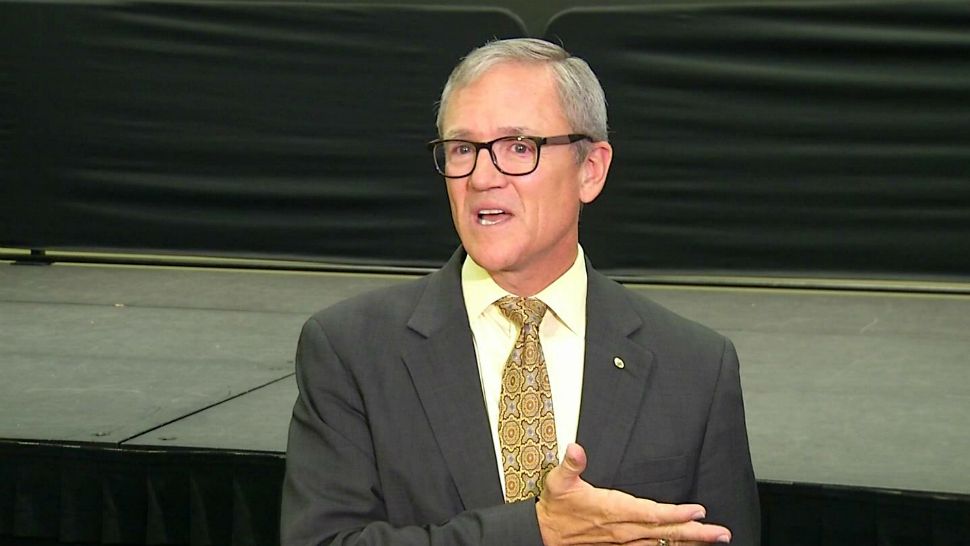ORLANDO, Fla. — In a deposition to Florida House committee staff, UCF President Dale Whittaker insisted he did not know that the school’s education and general funds could not be used for construction projects.
- President Dale Whittaker testified in deposition February 18
- He said he resurrected committee to oversee budget prioritization
- University Budget Committee co-led by CFO Bill Merck
- Merck resigned in the wake of the funds investigation
- READ: Former UCF President Dale Whittaker's Deposition | Former UCF CFO Bill Merck's Deposition
- PREVIOUS STORIES:
- Ex-UCF President Hitt: "I Won't Appear at Hearing; Travel is "Too Much"
- UCF Interim CFO Resigns, Says More Permanent CFO Needed
- UCF Board Accepts President Whittaker's Resignation
- UCF President Offers Resignation in Wake of Spending Scandal
- UCF Firing 4 in Wake of Investigation into Misuse of Funds
- UCF misused millions more for campus projects, president says
- UCF funding use for new building sparks Florida investigation
The deposition by Whittaker, who resigned last week, is part of a trove of documents related to the investigation into misspent funds at UCF, including emails, interviews, and meeting transcripts.
The school is under investigation for some $85 million in misspent funds for projects on campus. In particular, an audit determined the school used $38 million in Education and General funds to build Trevor Colbourn Hall, which opened in August 2018. That money should have come from the school's capital outlay budget.
In a February 18 deposition, Whittaker outlined his duties as provost and vice president for Academic Affairs, which he said was important in understanding what he focused on and what his knowledge base was in regard to the school's finances.
As part of that position, Whittaker said his responsibility was on the academic budget.
“My role in budgeting was focused on academic prioritization of the uses of our available funds,” Whittaker said.
He also said during the deposition that he was “fairly frustrated by the opacity” of the budget process at the school, so with former UCF President John Hitt’s blessing, he resurrected the University Budget Committee.
That committee helped with budget prioritization, and Whittaker said no capital projects went before the committee.
Former UCF CFO Disputes Aspects of Whittaker's Deposition
Co-chairing the committee with him was former Chief Financial Officer Bill Merck, who Whittaker said was responsible for “the integrity of our finances, for the integrity of the university’s financial position, and the integrity of the sources of funds.”
Merck, however, disputes that the committee did not discuss capital projects, or that transferring E&G funds for those projects was not discussed, either.
“I don’t know if he heard it, but I’m sure he saw it on written documents that were provided to him by facilities and accounting,” Merck told committee staff during his own deposition on February 16.
Merck, who resigned in the wake of the investigation, says Whittaker was present at least some of the meetings where the Colbourn Hall project was discussed.
Merck said he said in several meetings that he thought the school could be audited for the project.
Merck said that, in one meeting that included Whittaker and several UCF Board of Trustee members, he said he expected a state audit comment on the project, and no one responded to him.
Merck said he was concerned, once Whittaker assumed the presidency, that Whittaker didn’t really understand the way that a school operated outside of academic areas – and wasn’t really that interested in it.
“And that was worrisome for me because everything – to make an organization function properly, everything has to be balanced within that organization,” Merck said.
Merck said in the deposition that at the time of the planning for Colbourn Hall in 2013, which was just a renovation, not a new building, UCF officials believed they could use education and general funds for the project.
Who's to blame?
Fast forward to September 2018, after the debacle came to light. Merck resigned as CFO, as part of the effort to show the school was making changes.
When Merck met with Whittaker about his resignation, Merck said Whittaker implied that the CFO had done the right thing in funding Colbourn Hall, but he used the wrong method.
In subsequent statements, university officials pinned the blame for the Colbourn Hall debacle on Merck.
But Merck told committee staffers that it would be an exaggeration to say that Merck accepts full blame for the controversy.
Merck said he thinks that belief stemmed from a conference call he sat on with university officials and the chancellor of the Florida Board of Governors, Marshall Criser.
Merck said Criser angrily questioned him regarding the Colbourn Hall project, and wanted to know who else may have been involved in the decision.
Merck said he decided he wasn’t going to throw innocent people who worked for him under the bus.
“I’m the CFO, it’s my responsibility as CFO, rather than getting into answering questions about who else was involved and all that sort of stuff,” Merck said.
But he said that statement was later morphed by Whittaker into Merck taking full responsibility for the debacle.
Merck said he was only taking responsibility for the people that reported to him.
“That’s what I was trying to get across; not that I was taking on the responsibility for the president, for the provost, for the general counsel, for the chief auditor,” Merck said.
Merck said he believed that narrative evolved to protect President Whittaker and the UCF Board of Trustees.
“I was just, frankly, highly disappointed at the lack of integrity and the lack of honesty that I was experiencing with the leadership at the time,” Merck said. “To the point that I can tell you I could never work with that group again under any circumstance, because I would not trust them at all.”
Spectrum News staff are reading through the depositions and will post more as it becomes available.




